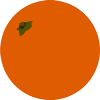Inter-
Ashley-Elizabeth Best
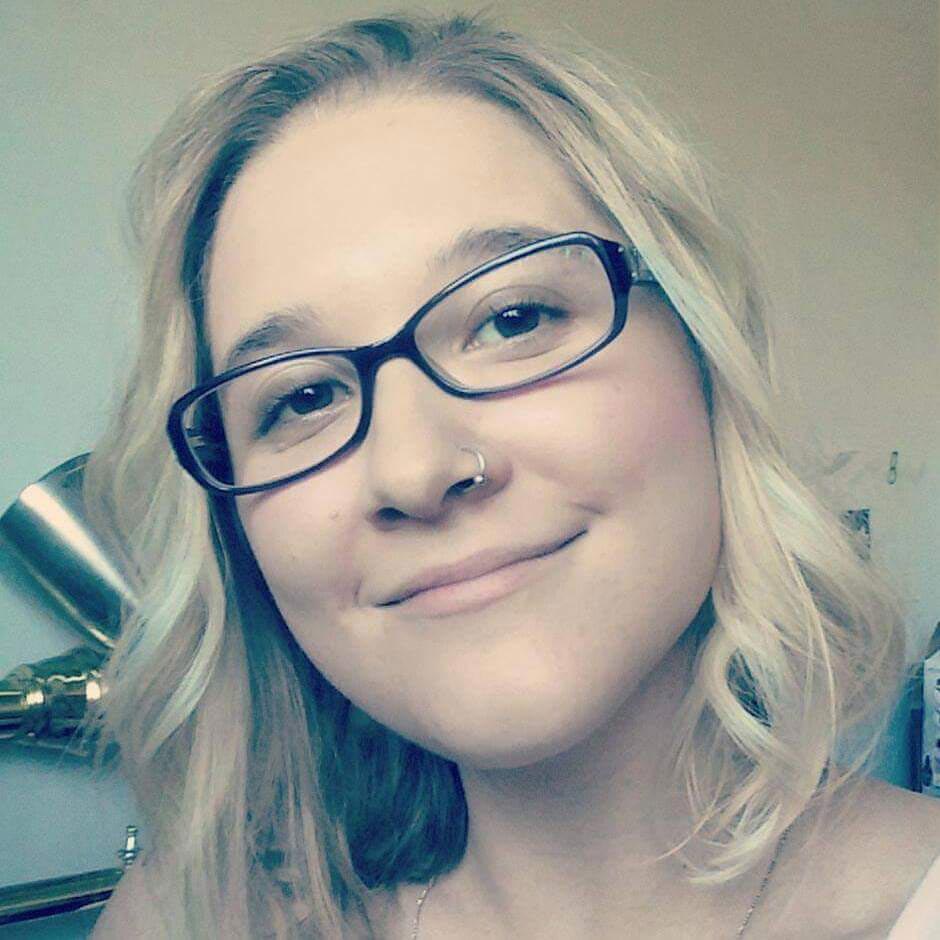
On Practice:
Do you write at the same time every day, in the same place? How would you describe your writing practice/s?
I prefer to work in my office, a spare bedroom I converted into a work space six years ago. The bulk of my writing happens there at an antique vanity I’ve repurposed as a desk. I’m easily distracted so having a space to sit down and focus in helps tremendously. This sounds ideal but I work irregular hours at my day job and don’t get as much time at my desk as I would like.
I make a lot of notes while I’m out in the world, especially while traveling on buses. I use the notes to write and map out poems when I get back to my desk. This is my favourite part, watching how all the notes I hastily scratched down coalesce into something whole and semi-lucid.
What do you do if you get stuck while writing a poem?
I do what most writers probably do, I leave it alone and do some research. I’ll revisit my notes and often that will spark an idea I couldn’t come to previously. If none of that works I visit a friend and have a drink. You know, not sitting at my desk until my head explodes, re-enter the flow of life.
Take a photograph of a page from your notebook or a screenshot of an electronic file of a poem you have been recently writing or revising.
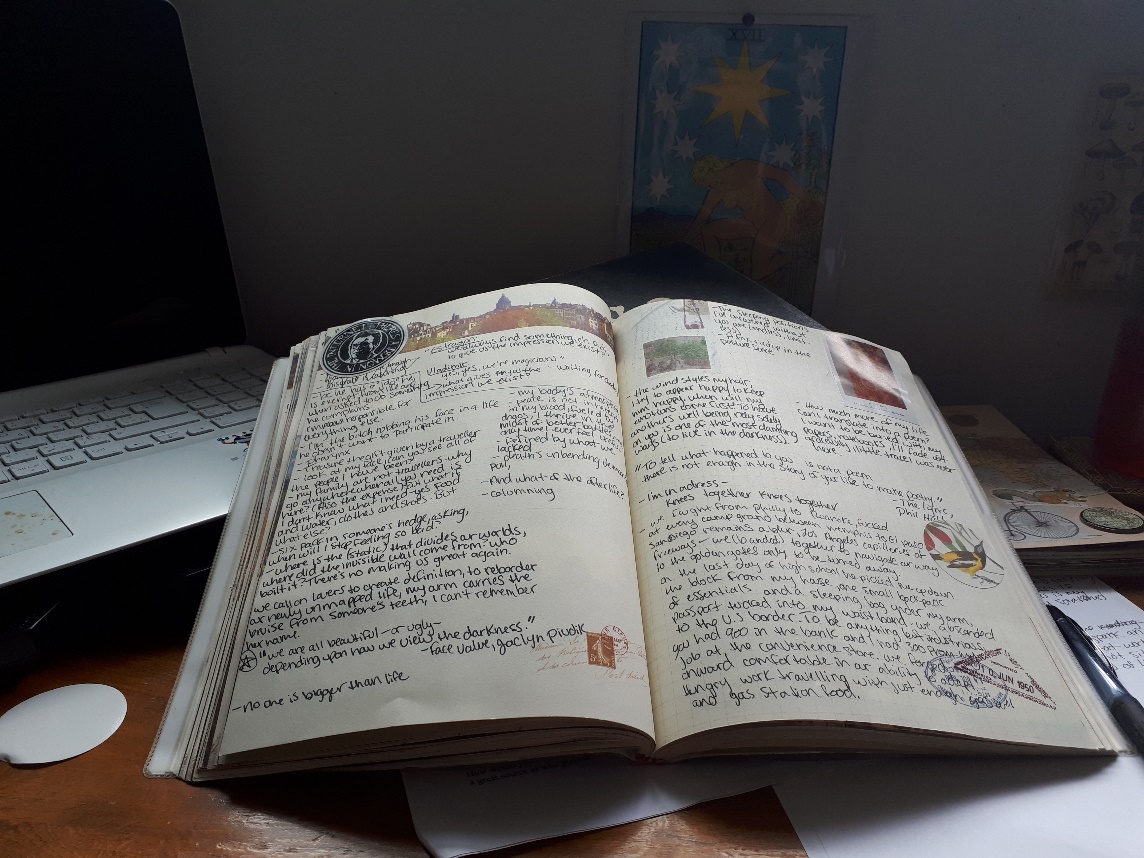
On Poetry:
Is there something you once believed about poetry that you no longer hold true? What changed?
It took a while but I learned that quantity does not equal quality. As I get older I’m more willing to prioritize my day-to-day life, especially my friends and my partner, than I once was. I want to be an active participant in my own life and not stagnate at a desk. If the writing happens, it happens, I try not to lose sleep over it anymore. What changed? I’ve lost a few people I cared very deeply for. Grief and loss changed my perspective on how I want to live and spend my time, while it is still mine.
What can/does poetry change?
I can only say what poetry does for me. It allows me space to luxuriate in my experiences and emotions. Poetry’s a compulsion I don’t fully understand, and to be honest I’m not sure I want to. We all have stories to tell and a voice to do just that, and through poetry I am able to find and share that voice.
Is there something you now think you know about poetry that you wish you’d known a decade ago?
That I don’t know much and that’s okay. Coming from a very working class background I always knew poetry was misunderstood and not valued. My younger self could have spent less time trying to convince my family that what I was doing was valid and worthy of their attention. It matters to me and that’s all I need. Oh, and also the value of failure. It’s okay to fail, and fail often. Let that poem go, burn it with fire and start over.
On Influence & Inspiration:
What books are on your night stand, the back of the toilet, your desk?
Oh dear. I have books everywhere, a veritable fortress of books. I really hope my floors don’t collapse. I have shelves dedicated to all sorts of subjects and writers, including Edna O’Brien, Miriam Toews, and all my beloved Canadian poets. On my bedside table is Anne Simpson’s Loop and The Dirty Dust by Máirtín Ó Cadhain translated from the Irish by Alan Titley.
Which writer/s do you (re)read the most? What does the writing do for you upon return?
When I’m stagnating with my language usage I reread Edna O’Brien and Louise Erdrich. They are very image-centered, lyrical and stimulating. Often they remind me of what I want to accomplish myself and give me that nudge to get back to my own project.
Among the poets you most admire, who has influenced you the least? Why have you not been influenced by his/her/their work?
I can’t say I’ve ever had this experience, if I admire a poet I will be influenced by them in some way or other.
Describe a moment from your life when you’ve been overcome by how beautiful something is.
I often feel overwhelmed by beauty. Isn’t that how we get into this mess of writing? If I had to pick specific instances I would say the way the wind animates the treetops outside my office window, my niece relaxing in a sunspot after a swim, and my partner’s candidly wide smile.
On Teaching:
How would you describe poetry to a four-year-old? To the non-literary family ancestor you imagine as a great source of who you are?
I think my niece knows what poetry is without explanation. I suspect she’s a better poet than I am. If I had to though, I would say poetry is how you tell your story. The right words in the right order that say something meaningful before you fully understand what they mean.
I would probably say the same thing to a non-literary ancestor.
What characteristics does your ideal poem possess?
I want a poem to be whatever it needs to be. Fierce and courageous or quiet and courageous, as long as it has vivid sound-centered images, I might enjoy it. Some playfulness is always nice too, but mostly I like poems that remind me of everything I want to be or write myself.
Do you teach poetry? If so, what are you trying to teach through poetry? What has poetry taught you?
I have but I do not currently teach poetry. I like to focus on helping emerging poets discover their own process, sort of demystifying how they think poetry is produced and under what circumstances. Once you understand your own way of writing poems it creates space to discover your own voice and nourish it. I can’t teach voice but I can help clear the path for students to get there themselves.
On Publishing & Themes Present/Future:
How has publishing your poems changed your writing practice, process, and product?
I view publishing as an avenue to reach an audience and that’s it. Having your work published provides a great boost to your confidence, especially if you work alone, but there’s still work to be done.
Is there a poem you’ve always wanted to write but haven’t? If so, why are you waiting? What subjects, themes, forms, aesthetics, etc. do/will you explore in your work?
If I want to write a poem I do it and see what the final product is like. I’m not shy or hesitant about going after what I want. The only thing that could get in the way for me right now is time.
As for themes and subjects, I tend to write about dysfunctional familial and romantic relationships, oh and landscapes. However, I am attempting to move away from these subjects and find another approach to writing. I’m in the middle of it right now, so we’ll see how it goes.
On Oranges:
Oranges or apples? Why?
Oranges for sure because half of my front tooth is false and to bite into an apple could result in me losing part of my tooth. I’ll stick to oranges.
About the Poet
Ashley-Elizabeth Best is from Cobourg, Ontario. Her work has appeared in a variety of Canadian and international publications, including CV2, Grist, Ambit Magazine, and The Literary Review of Canada. She was a finalist for the Robert Kroetsch Award for Innovative Poetry in 2015. Her first book of poetry is called Slow States of Collapse (ECW Press, 2016). She lives and writes in Kingston, Ontario.
Inter-
Peycho Kanev
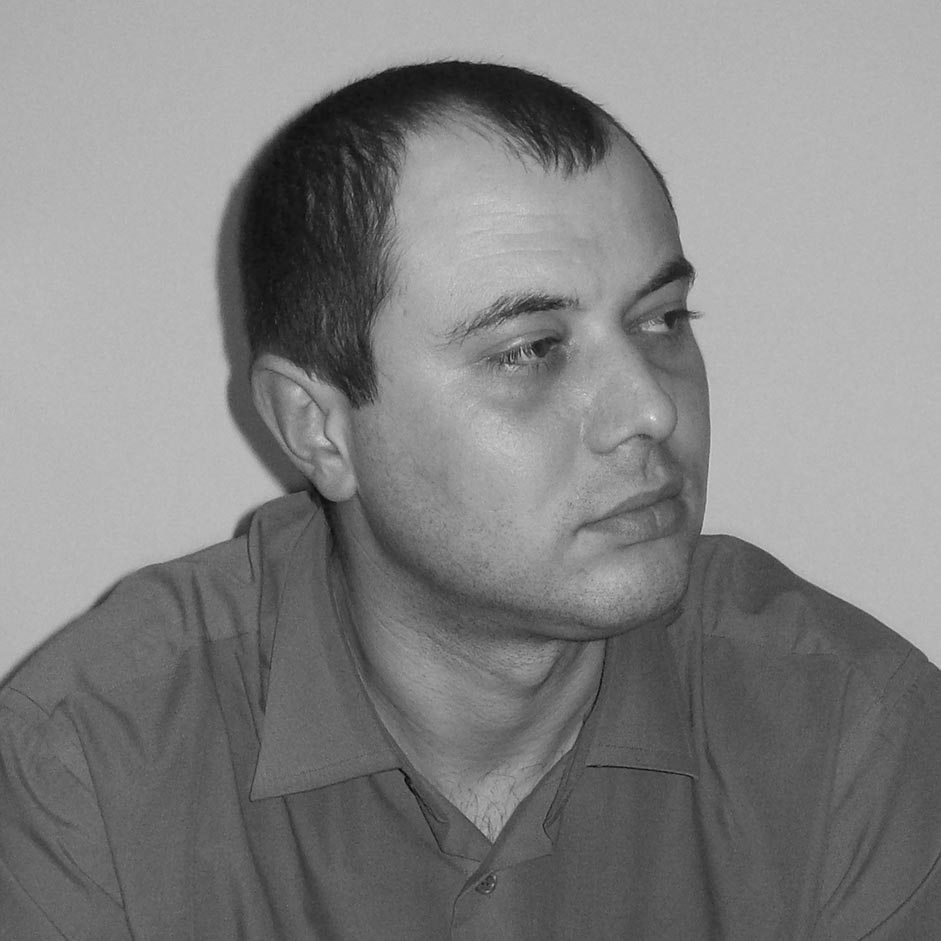
On Practice:
Do you write at the same time every day, in the same place? How would you describe your writing practice/s?
Yes, sometimes. But I can’t write every day. I guess the everyday writers are the prose writers, the novelists. It doesn’t work this way for poetry, at least for me. Sometimes I dream about something and I wake up and stand up to write it down. About my writing practices… Well, if I have an idea about a poem, I mean if it is crystal clear in my head and at my fingertips I just sit down and write it, but if it is still a little bit of shadowy, I do not sweat it, I just let my subconscious deal with it when the time is right.
What do you do if you get stuck while writing a poem?
Just like I said, I do not push it too much and I don’t think about the poem if I got stuck writing it. I just start doing something else, I play music or read something or whatever, and sometimes my subconscious solves the problem and tells me how to proceed. In other words, I do not believe in the forced writing of poetry.
Take a photograph of a page from your notebook or a screenshot of an electronic file of a poem you have been recently writing or revising.
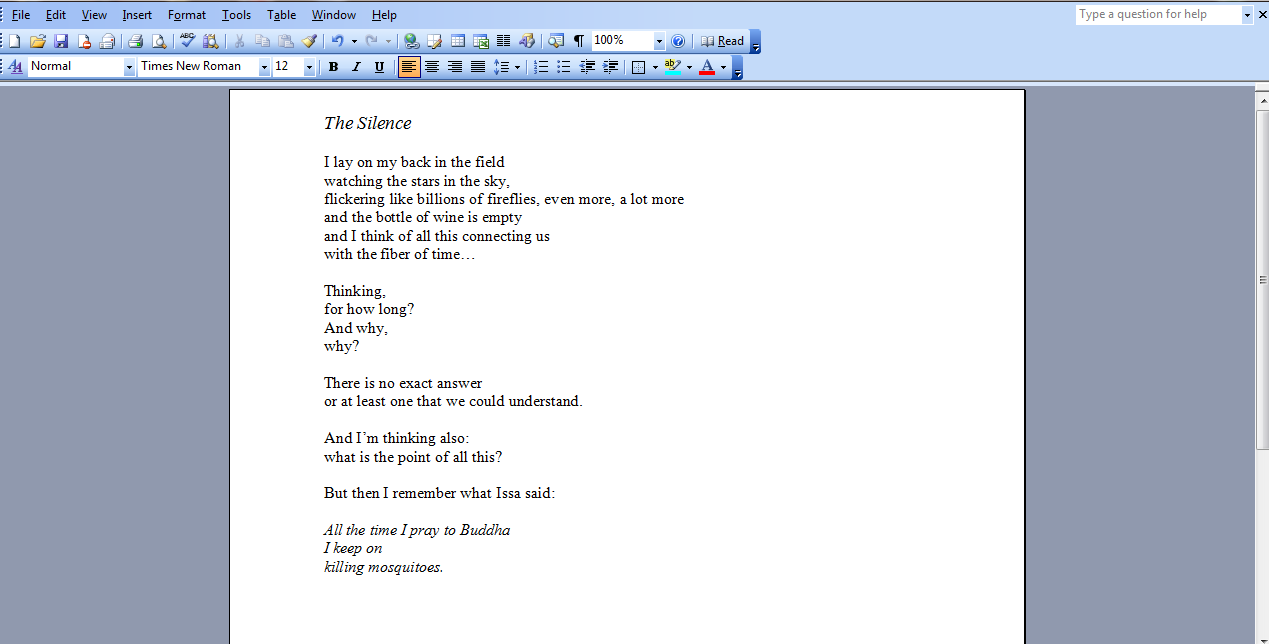
On Poetry:
Is there something you once believed about poetry that you no longer hold true? What changed?
About poetry, no. But I’m still replacing my favorite poets, those I’ve read when I was younger, with other poets. And I am still a firm believer in poetry, my views have not changed at all. I’m not a religious person, I have only my words to believe in.
What can/does poetry change?
A lot of things and almost nothing. It depends on what kind of person you are, what you carry in the deepest parts of your heart. Sometimes poetry can bring light, but sometimes it can bring the good old darkness. I do believe that poetry changed me for good.
I do, truly, believe that poetry’s power is in the way it nestles into us and changes the way we feel in the world. Emotion has the power to incite action, and that is where poetry is at its best.
Is there something you now think you know about poetry that you wish you’d known a decade ago?
Yes, there is one thing and it goes like this: Poetry is one of the most brutal arts.
On Influence & Inspiration:
What books are on your night stand, the back of the toilet, your desk?
Right now on my night stand: Mr. Sammler’s Planet by Saul Bellow, Memories of My Melancholy Whores by Gabriel Garcia Márquez, and The Selected Poems of Tu Fu. On my desk: The Chronology of Water: A Memoir by Lidia Yuknavitch, Brown Dog by Jim Harrison, and Narrow Road to the Interior by Matsuo Basho. On the back of the toilet: The Broom of the System by David Foster Wallace—and it has been there for quite some time.
Which writer/s do you (re)read the most? What does the writing do for you upon return?
Oh, I can mention a lot of names here but let me say that I re-read the good writers, those who can teach me the craft, but sometimes I read some that are not so good, just to learn how not to do it. Of course I read over and over again my favorite poets.
Among the poets you most admire, who has influenced you the least? Why have you not been influenced by his/her work?
I believe that the poets I admire and influenced me the least are the old Chinese masters, you know Wang Wei, Li Bai, Du Fu, Hanshan, because those men were from almost another universe. I mean they are great poets and I just love to read them again and again, but I can’t imagine I could write the way they do.
Describe a moment from your life when you've been overcome by how beautiful something is.
Every time I’m somewhere in nature: mountain, in the middle of a lake, in a sunflower field, on the ocean shore. I think the late poet and writer Jim Harrison said it best in his memoir Off to the Side: “In my remote cabin during my sixty-third summer I dreamt that after a lifetime in which I had spent thousands and thousands of days outdoors looking “at” nature I was finally inside looking out.” Exactly that feeling!
On Teaching:
How would you describe poetry to a four-year-old? To the non-literary family ancestor you imagine as a great source of who you are?
I’m not really sure how. Let me think. Maybe I will tell the kid the things that I write make the clouds, the sun, and the people look more beautiful. Maybe I will enter with the child in some dark room, then I will light one candle and I will tell him—this is poetry! To the non-literary family ancestor I would say that I write lullabies for grown-ups. Something like that.
What characteristics does your ideal poem possess?
A heart, fire, laughter, madness, truth, flawlessness, darkness, light, deepness, intensity, guts, etc.
Do you teach poetry? If so, what are you trying to teach through poetry? What has poetry taught you?
I do not believe poetry can be taught. I believe that the great poet Joseph Brodsky gave the perfect answer on this subject during the trial against him in the Soviet Union in 1964 when the state charged him with “social parasitism.”
Judge: “Who has decided that you’re a poet? Who has ranked you as a poet?”
“No one,” Brodsky replied, “Who enrolled me in the ranks of the human race?”
Judge: “Have you studied poetry at an institution? Have you prepared for a university course where you’re taught to write poetry?”
Brodsky: “I don’t think poetry comes from an education.”
Judge: “Well then, where does it come from?”
Brodsky: “I think that it comes from God.”
On Publishing & Themes Present/Future:
How has publishing your poems changed your writing practice, process, and product?
I think I became much more responsible in my writing. But it is a normal thing that as you grow your poems evolve as well. And, I still write like I will be the only person who will read my poetry. I do not think at all about the readers while I work on the poem. Slowly but surely I’m getting there.
Is there a poem you've always wanted to write but haven’t? If so, why are you waiting? What subjects, themes, forms, aesthetics, etc. do/will you explore in your work?
The poem I’ve always wanted to write is impossible: a tiger that flies. There is always a poem that you just can’t write no matter how many times you’ll try. But I tend to write on a variety of topics: from children and happiness to darkness and war. I write about time, the cosmos, the horror of the human experience, a little bit on politics, girls, women, society, loneliness, nature, rivers, dogs, cats, birds, wine, etc.
On Oranges:
Oranges or apples? Why?
Oranges, of course. Because they resemble the sun.
About the Poet
Born in Silistra, Bulgaria, Peycho Kanev is the author of four poetry collections and two chapbooks, published in the USA and Europe. His poems have appeared in many literary magazines, such as: Poetry Quarterly, Evergreen Review, Front Porch Review, Hawai'i Review, Barrow Street, Off The Coast, The Adirondack Review, Sierra Nevada Review.
